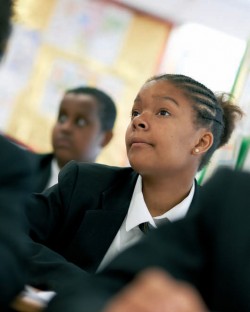Today you will…
Understand the idea of islamophobia and consider what is wrong with some examples of islamophobia; think about whether religious hatred is as bad as racism; consider how prejudice can be reduced; think through a range of ideas and examples that might reduce prejudice; apply values, beliefs and religious teachings to situations of prejudice or injustice
Starter activity
A University of Cardiff study counted all the stories in the media about Muslims and Islam for 8 years. They looked at about 400 newspaper stories per year. Three kinds of story topped the league, accounting for 67% of the stories altogether. Give pupils in pairs a minute to suggest what these three kinds of story might have been. They must note their guesses. Then reveal the real answer: religion and cultural stories / stories about terrorism / stories about extremism.Now get students to guess how that 67% of stories was divided between the three types of story. The answer is 36% of stories were about terrorism, 20% about religious and cultural issues and 11% about Muslim extremism. Interestingly, only 5% were stories where Muslim people were the victims of attacks. If that’s the picture of Islam the papers shove down your throat, then where could you go to get a more accurate and fair picture? Are 36% of Britain’s 1.4 million Muslims terrorists? No, not even 0.1% are, according to the courts.
Main Activity
Prejudice
Are some people prejudiced against teenagers? How does it show? Do the papers give teenagers a fair portrait, or do they use stereotypes? What other examples do we know about? Begin by asking pupils to identify and list examples of prejudice. Can they categorise these – for example as class prejudice, racism, sexism, ageism? Draw attention to the damage done when prejudice has power – Nazism and Hitler provides the most extreme example, but many more might be noted. Consider with the class if prejudice comes from fear, or phobia. Often, this is a factor.
Islamophobia.
Introduce this idea carefully, as the unnecessary fear of the Muslim religion, and an example of prejudice. Can pupils suggest any examples? Does this prejudice come from the media perhaps, where a billion Muslim people are judged by the un-Islamic actions of 19 suicide bombers on 9/11? Ask pupils to identify how this prejudice might damage British society today.

Reducing prejudice
Ask pupils in pairs to split a page into four and make notes of their suggestions about what could be done by four parties to reduce prejudice in the five situations below (these could be elaborated imaginatively).The four parties are: the media / non-Muslim British people / British Muslims / politicians and government.
School
In a village primary school, there are only white people. The teachers don’t want the children to grow up ignorant of the UK and the wider world, so they have a meeting to plan what the 5-11s should learn. What should the primary children learn about Muslims and Islam?
Mosque
A new mosque has opened in town. A few weeks after the celebrations, widely supported, there are several incidents where groups of young white teenagers throw stones at the mosque, and break windows, before running off.
Dress
Several Muslim women who wear the Hijab, covering their faces, have had insults and some threats shouted at them in the streets of the town, usually by people who run away. It’s upsetting, so they arrange a meeting with the local police to see if anything can be done.
Food
A butcher opens a new shop in a town near you, where many Muslim people live. It doesn’t do very well, because no Muslims use the shop. The butcher realises it’s because he doesn’t sell halal meat.
Jobs
The local unemployment figures show that 3% of people have no job, but it is 7% of Muslims who have no work. It seems unfair, so the job centre decides to make a plan to reduce Muslim unemployment. But then some white people start to say ‘we need jobs too’.
When these five scenarios have been considered by pairs of pupils, pool their ideas for prejudice reduction. Ask the pairs to imagine what will happen next in two of the scenarios, and swap ideas in groups of four about how effective their plans to reduce prejudice might be.
A charter for fairness
In the light of this work, ask groups of four to create a six-point plan for a fairer Britain, where prejudice is reduced. If they find this hard, then you could give them a dozen suggestions and ask them to pick the five they think would be fair and would work best.
Being british!
One typical stereotype of a British person in the American media is that you need to do at least half of these things to be British: speak in a posh voice, ride in black cab taxis, love the Queen, eat fish and chips every Friday, drink tea from china cups, talk about Winston Churchill. How many pupils in your class do none of these? Take a vote! Here’s another stereotype of British-ness: watches football / drinks beer / wears Union Jack boxer shorts / enjoys a fight / eats vindaloo curries / reads The Sun. Does anyone do all these things? Stereotypes can be fun, but it’s not funny if they lead on to prejudice. Ask pupils what they think is typical of being British, and ask them if British Muslims would agree.
Home learning
Ask pupils to search for images of Islam from the websites of national newspapers, and bring in two examples they think are unfair and two they think are balanced for the next lesson.
Summary
At the end of the lesson, give pupils 3 post it notes, on which they should complete three statements before they leave: ‘What I learned today about Muslims in Britain was…’ ‘Two things I try to do to reduce prejudice are…’ ‘I think it’s good to learn about this topic because…’ Here are some levelled outcomes for RE teachers to use in assessing how the lesson is going:
• Pupils can understand some of
• Pupils can make links between beliefs and actions (L3). the issues involved in inter-faith relations (L4).
• Pupils can explain and express their views on questions about prejudice against Islam in Britain today (L5)
• Pupils can express clear arguments both for and against the opinions they hold about whether or not the stereotypes and media images are unfair (L6)
Info bar
Additional resources
Questions: Muslims is a fine book for teachers edited by stephen pett from re today, retoday.org.uk/shop £9.50 (photocopiable)
Stretch them further
Get your high flyers to look at the Cardiff University report mentioned at the start of the article tinyurl.com/couqefk. ask them to find out six interesting facts and turn them into a guessing game for the rest of the class – and you!
About the expert
Lat Blaylock is an RE adviser in Britain with RE Today, the magazine which he edits. After a long teaching career in multi religious Leicester schools, he now writes, advises and trains teachers. His advisory work includes developing five series of BBC religious educational broadcasts for school RE.









